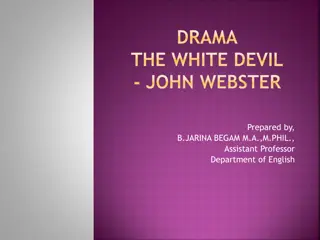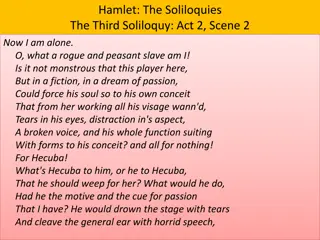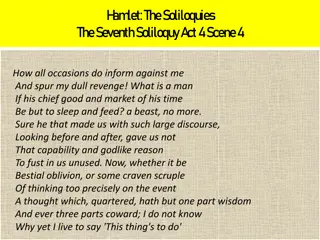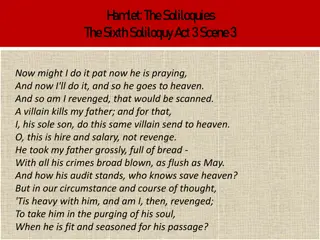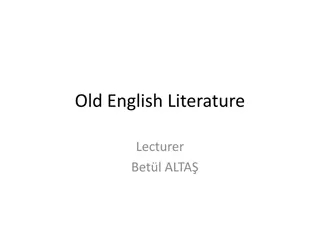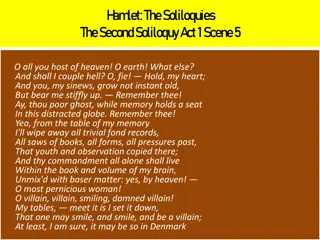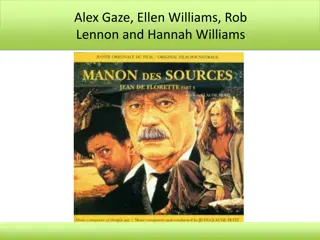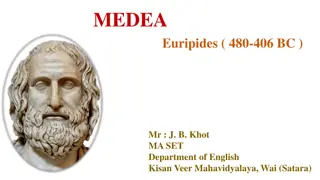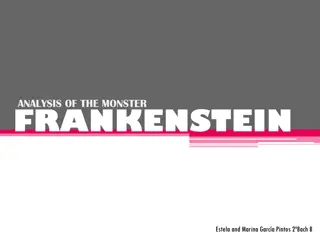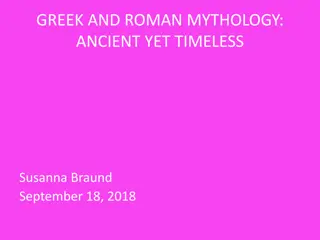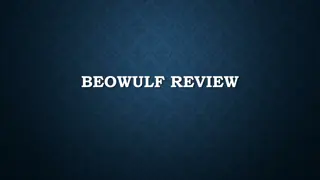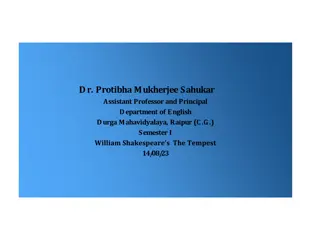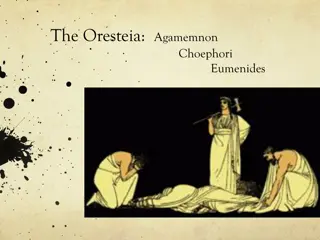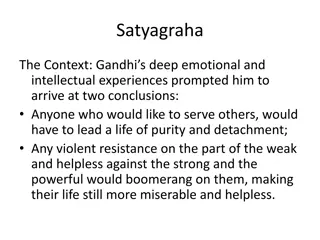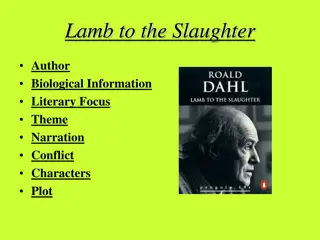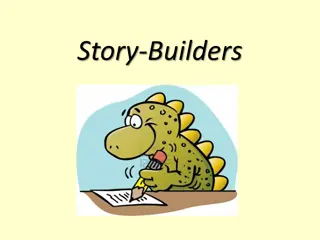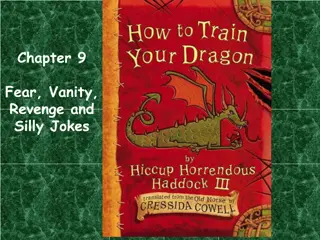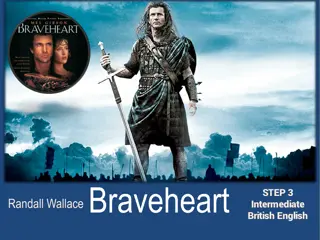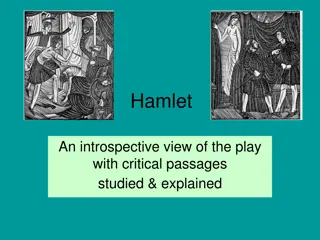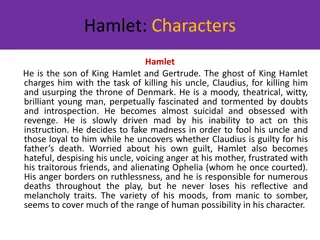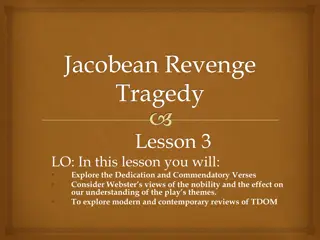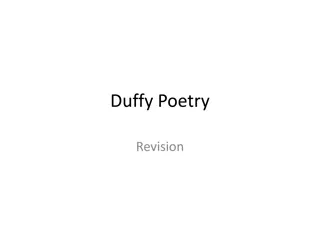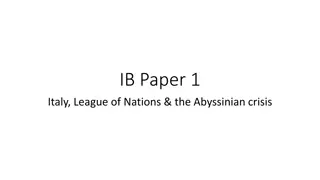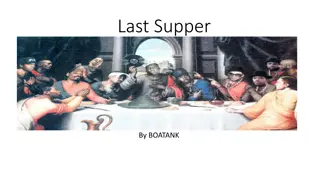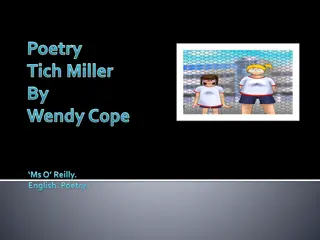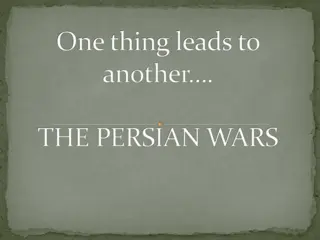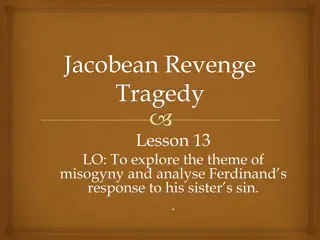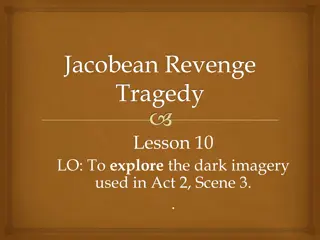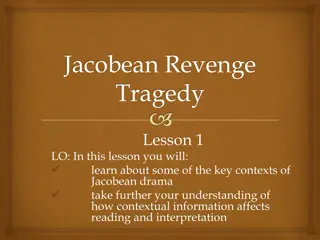Analysis of John Webster's Play "The White Devil" and Its Themes
John Webster's play "The White Devil" is a revenge tragedy that explores themes of revenge, retribution, and cyclical nature of vengeance. The complex characters, intricate plot, and genre-bending elements make it a significant work in English literature, despite initial poor reception. The play del
8 views • 27 slides
Understanding the Prohibition of Harming and Seeking Revenge in Islamic Studies
The lesson focuses on the Islamic principle of avoiding harm and refraining from retaliating harm, emphasizing compassion and tolerance in dealing with societal conflicts. The teachings highlight the significance of mercy in Islamic Shariah as a means to achieve happiness and peace in this world and
2 views • 15 slides
Hamlet: The Third Soliloquy from Act 2, Scene 2
Hamlet contemplates his own indecision and lack of action in seeking revenge for his father's murder. He questions the player's ability to feel deeply for a fictional character and expresses his frustration at his own inaction. Through introspection, he resolves to use a play to uncover the truth an
0 views • 10 slides
Hamlet's Seventh Soliloquy: Reflections on Revenge and Inaction
Prince Hamlet reflects on the nature of revenge, his own inaction, and the contrast between his hesitation and the willingness of soldiers to die for trivial causes, ultimately resolving to be resolute and decisive in seeking retribution.
1 views • 9 slides
Analysis of Hamlet's Sixth Soliloquy in Act 3, Scene 3
Hamlet's Sixth Soliloquy in Act 3, Scene 3 delves into his inner turmoil as he contemplates seeking revenge on Claudius for his father's murder. Despite having the perfect opportunity to kill Claudius while he prays, Hamlet hesitates, questioning whether sending him to heaven would truly be an act o
0 views • 7 slides
Exploration of Old English Literature through Beowulf
Discover the roots of English literature through Beowulf, the oldest epic poem that delves into the adventures of heroic figures like Hrothgar and Beowulf himself. Uncover the essence of the Old English language and its impact on literary epics. Explore the themes of bravery, revenge, and mortality
0 views • 17 slides
Hamlet's Second Soliloquy: The Revelation and Vow for Revenge
Hamlet's second soliloquy in Act 1, Scene 5, follows the shocking revelation from his father's ghost that Claudius is the true murderer. Filled with grief and anger, Hamlet vows to avenge his father's death, referring to his mother as a "pernicious woman" and his uncle as a "smiling damned villain."
0 views • 5 slides
Manon des Sources - French Heritage Melodrama Analysis
Manon des Sources is a French film that follows the sequel to Jean de Florette, based on a novel by Marcel Pagnol. It explores themes of love, revenge, and family dynamics in a rural setting. The film has been critically acclaimed for its portrayal of French heritage and the contrast between rural l
0 views • 13 slides
Exploring the Tragedy of Medea by Euripides
Discover the gripping tale of Medea, a powerful sorceress seeking ruthless revenge after being betrayed by her husband, Jason. Dive into the world of ancient Greek tragedy as Medea's story unfolds, showcasing themes of injustice, passion, and the consequences of betrayal.
2 views • 23 slides
Analysis of the Monster Frankenstein by Estela and Marina García Pintos
The monster in Frankenstein, created by Victor Frankenstein, is a giant, hideously ugly creature with delicate emotions seeking companionship. Initially feared and rejected, he longs for connection and is betrayed by his creator. The monster's journey unfolds through loneliness, longing, revenge, an
1 views • 11 slides
Exploring Greek and Roman Mythology: Ancient Stories of Gods and Heroes
Uncover the timeless tales of Greek and Roman mythology, delving into creation stories, powerful goddesses, mighty gods, heroic archetypes, and captivating myths like the story of Pygmalion. Join the journey through rich narratives of love, revenge, transformation, and divine intervention woven into
0 views • 13 slides
The Legendary Adventures of Beowulf
Beowulf is a courageous warrior who battles three formidable monsters - Grendel, Grendel's Mother, and a Dragon. He defeats each adversary with valor and strength, showcasing his prowess as a warrior and leader. As king of the Geats, Beowulf's heroic deeds and ultimate sacrifice inspire loyalty and
2 views • 11 slides
Analysis of William Shakespeare's "The Tempest" and Its Themes
The Tempest" by William Shakespeare is a tale of magic, betrayal, and revenge set on an enchanted island. The play follows the exiled Prospero as he seeks justice while exploring themes of power, forgiveness, and redemption. Through a cast of intriguing characters and intricate plots, Shakespeare de
2 views • 26 slides
Analysis of "The Laboratory" by Robert Browning
The poem "The Laboratory" by Robert Browning portrays a sinister narrative of a jealous woman seeking revenge on her ex-lover's new interests. Set in pre-revolutionary France, the poem delves into themes of betrayal, jealousy, and vengeance through the perspective of the narrator planning a murderou
0 views • 11 slides
The Oresteia: Agamemnon, Choephori, Eumenides - Reflections on War, Revenge, and Reconciliation
The Oresteia trilogy delves into themes of war, revenge, and reconciliation through the story of Agamemnon, Clytemnestra, and the chorus. It explores the aftermath of the Trojan War, highlighting the cycles of violence and the quest for justice. Through vivid imagery and powerful storytelling, the p
0 views • 16 slides
The Skinhead Hamlet - Act 1, Scene 4
In Act 1, Scene 4 of "The Skinhead Hamlet," the Ghost reveals to Hamlet that he was murdered by Claudius, the current king of Denmark. The Ghost urges Hamlet to seek revenge for his untimely death, shedding light on the treachery that led to his demise. This snippet captures the intense and pivotal
0 views • 18 slides
Insights into Elizabethan Beliefs in Shakespeare's "Hamlet
Act 1, Scene 1 of "Hamlet" introduces characters and Elizabethan beliefs like ghostly encounters, the power of Latin to exorcise spirits, and the constraints of ghosts. Horatio's skepticism evolves, validating ghostly apparitions for the audience. The scene contrasts superstitions, hierarchy, and ed
0 views • 8 slides
Analysis of Staging the Spirit in Shakespearean Drama
Exploring the significance of staging spirits in Elizabethan drama, particularly in Hamlet, sheds light on how Shakespeare cleverly blended Protestant and Catholic viewpoints through characters like Horatio and the ghost. The meeting between Hamlet and his father's spirit marks a pivotal moment in t
0 views • 14 slides
Understanding Satyagraha: Gandhi's Nonviolent Resistance
Gandhi's concept of Satyagraha emphasized truth and nonviolence, leading to passive resistance against injustice. Rooted in purity and detachment, Satyagraha uplifts both the oppressed and oppressors, offering a dynamic and powerful means to confront evil without bitterness or revenge.
0 views • 6 slides
Exploring Themes and Characters in Shakespeare's "Hamlet
Delve into the themes of revenge and tragedy in Shakespeare's "Hamlet" through an analysis of key scenes, characters, and language techniques. Explore the consequences of revenge, character motivations, and the atmospheric contrasts between scenes. Uncover the intricacies of the opening scenes, char
0 views • 52 slides
Exploring 'Lamb to the Slaughter' by Roald Dahl: A Tale of Betrayal and Revenge
Dive into Roald Dahl's darkly humorous short story, "Lamb to the Slaughter," where Mary seeks revenge on her husband Patrick with a cunning act of murder. The story unfolds with irony, betrayal, and conflict as Mary outwits the detectives investigating the crime. Through a gripping plot and unique n
1 views • 9 slides
Unorthodox SQL Techniques Unleashed: REVENGE: The SQL
Explore the unconventional realm of SQL with Rob Volk as he delves into extreme methodologies for manipulating data. From revenge-driven practices to extreme server admin tricks, this session is a wild ride through unparalleled SQL strategies.
0 views • 16 slides
Unraveling the Tale of Prince Arthur and the Black Knight
Prince Arthur is faced with a challenging battle against the resurrected Black Knight seeking revenge in Camelot. With the guidance of Merlin and the power of Excalibur, the kingdom is restored to peace. This adventurous tale showcases courage, loyalty, and the triumph of good over evil in Camelot.
0 views • 27 slides
Fear, Vanity, Revenge, and Silly Jokes in Chapter 9
Dive into Chapter 9 where Horrorcow's disinterest in fishing, Toothless's stubbornness, and humorous jokes create a whimsical atmosphere. Explore how jokes and funny stories are used to make Toothless laugh, igniting laughter in unexpected places.
0 views • 4 slides
Braveheart: The Beginning of a Young Hero's Journey
In the year 1276, a young Scottish boy named William Wallace witnesses a brutal massacre that changes his life forever. With his father and brother slain, William is left with a burning desire for revenge against the English. Guided by his uncle, William begins his journey towards becoming a legenda
0 views • 53 slides
Exploring Revenge in Poetry and Prose
Analyze the theme of revenge in William Blake's "A Poison Tree" and Edgar Allan Poe's "The Cask of Amontillado." Compare the use of point of view, imagery, irony, and thematic elements in both works. Engage in critical thinking discussions, visual representations, and thematic statement writing to d
0 views • 9 slides
Exploring Shakespearean Soliloquies and Female Characters
Delve into the world of Shakespearean soliloquies, a device used in drama to reveal characters' innermost thoughts and feelings to the audience. Discover the uniqueness of Shakespeare's works, including his famous plays like Macbeth, Romeo and Juliet, and Hamlet. Explore the seven types of female ch
0 views • 14 slides
Exploring the Intriguing Depths of Shakespeare's Hamlet
Delve into the world of Hamlet, a timeless play by Shakespeare, through critical passages and explanations. Uncover the basic and detailed background information, the dramatic structure overview, basic plot structure, and the genre of revenge tragedy that shape this introspective masterpiece.
0 views • 20 slides
Character Analysis of Hamlet: A Tragic Tale of Revenge and Betrayal
Son of King Hamlet, Hamlet is charged with avenging his father's murder by his uncle, Claudius, in Shakespeare's iconic play. As Hamlet spirals into madness and dark thoughts, he struggles with doubts, guilt, and revenge. Claudius, the cunning antagonist, hides his guilt while plotting against Hamle
0 views • 7 slides
Exploring the Dedication and Commendatory Verses in Jacobean Revenge Tragedy Lesson
In this lesson, we delve into the Dedication and Commendatory Verses of Jacobean Revenge Tragedy plays, particularly focusing on Thomas Middleton's commendation in Latin, Webster's dedication to George Harding, and the significance of Latin in academia. Through analysis of these elements, we gain in
0 views • 9 slides
Understanding Tragedy in English Literature: An Overview
Tragedy, as defined by Aristotle, is the imitation of a serious action complete in itself, depicted through language and incidents that evoke pity and fear. This introduction delves into the key elements of tragedy, such as plot, character, thought, diction, song, and spectacle, with a focus on Thom
0 views • 13 slides
The World of Restoration Comedy: Satire and Society in 17th Century London
The Restoration era saw the rise of Comedy of Manners, reflecting the upper class lifestyle with wit and satire. Playwrights like William Wycherley and William Congreve crafted plays that critiqued societal norms, focusing on themes of love, marriage, and social conduct in London. The plays feature
0 views • 4 slides
Analysis of Duffy's Poems: Havisham and Mrs. Midas
Exploring the themes of love, hatred, and consequences in Carol Ann Duffy's poems "Havisham" and "Mrs. Midas". These poems delve into the psychological impacts of heartbreak, revenge, greed, and isolation through the lenses of iconic literary characters. Duffy's powerful portrayal of human emotions
0 views • 19 slides
Abyssinian Crisis: Italy, League of Nations, and the Invasion of Abyssinia
The Abyssinian crisis of the 1930s was sparked by the Wal-Wal Incident, leading to the Italian invasion of Abyssinia. Mussolini's aims in invading Abyssinia included territorial expansion and revenge. Despite diplomatic efforts, the invasion occurred with Mussolini believing that the UK and France w
0 views • 11 slides
Betrayal and Revenge in "Last Supper" Poem by Liz Lochhead
Last Supper" by Liz Lochhead delves into themes of unfaithfulness, deceit, humiliation, and revenge through the narrative of a cheating boyfriend exposed by his partner. The poem employs various literary techniques like similes, imagery, and parenthesis to vividly depict the protagonist's wrath and
0 views • 8 slides
The Poetic Portrayal of Tich Miller's Struggles
The poem delves into the life of Tich Miller, a girl with disabilities who faces alienation and cruelty from her classmates. Through vivid imagery and poignant themes of exclusion and humiliation, the poet brings Tich's struggles to life. The poem also explores the poet's own transformation from a v
0 views • 24 slides
The Persian Wars - One Thing Leads to Another
The Persian Wars were a series of conflicts triggered by events like the Ionian Revolt, leading to the Persian Empire seeking revenge on Athens. Starting with small fleets and culminating in the Battle of Marathon, the Greeks, though initially the underdogs, managed to repel the Persians. The Atheni
0 views • 15 slides
Exploring Misogyny in Jacobean Revenge Tragedy
The theme of misogyny in Jacobean revenge tragedy plays like "The White Devil" and "The Duchess of Malfi" is examined, focusing on the societal and biblical contexts that influence the portrayal of female characters. Through analysis of Ferdinand's response to his sister's sin, the exploration delve
0 views • 8 slides
Exploring Dark Imagery in Jacobean Revenge Tragedy
Delve into the intricate use of dark imagery in Act 2, Scene 3 of a Jacobean revenge tragedy. Analyze a compelling quotation, unraveling layers of meaning, exploring punctuation nuances, and linking it back to the context and critical readings. Engage with classmates to share insights and interpreta
0 views • 7 slides
Key Contexts of Jacobean Drama
Explore the key contexts of Jacobean drama, including themes of revenge, ethical arguments, and the influence of ancient philosophers like Aristotle. Understand the origins of tragedy and delve into the elements that define Jacobean Tragedy. Discover the relevance of Plautus and Seneca, and examine
0 views • 11 slides
